Rnsg misc - Study guides, Class notes & Summaries
Looking for the best study guides, study notes and summaries about Rnsg misc? On this page you'll find 79 study documents about Rnsg misc.
Page 4 out of 79 results
Sort by
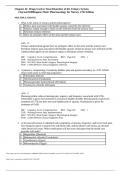
-
Chapter 41: Drugs Used to Treat Disorders of the Urinary System Clayton/Willihnganz: Basic Pharmacology for Nurses, 17th Edition
- Exam (elaborations) • 8 pages • 2023
- Available in package deal
-
- $8.49
- + learn more
1. What is the action of urinary antimicrobial agents? a. Reduce pain associated with bladder spasms caused by the infection b. Enhance output enough to flush out the infection from the urinary tract c. Eliminate urinary retention d. Have an antiseptic effect on the urine and the urinary tract ANS: D Urinary antimicrobial agents have an antiseptic effect on the urine and the urinary tract. Pyridium reduces pain associated with bladder spasms related to urinary tract infection (UTI). Anti...
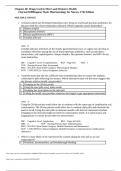
-
Chapter 40: Drugs Used in Men’s and Women’s Health Clayton/Willihnganz: Basic Pharmacology for Nurses, 17th Edition
- Exam (elaborations) • 8 pages • 2023
-
- $9.49
- + learn more
2. A patient states that she has a difficult time remembering when to resume her triphasic contraceptive pills following her menses. Which alternative plan will the nurse suggest that she discuss with her health care provider? a. Changing to the 28-day packet b. Using the inert pills every other month c. Changing her prescription to the mini pill d. Calling the health care provider whenever she forgets to get appropriate instruction ANS: A Using the 28-day packet would allow her to conti...
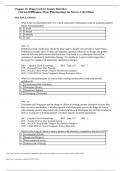
-
Chapter 15: Drugs Used for Anxiety DisordersClayton/Willihnganz: Basic Pharmacology for Nurses, 17th Edition
- Exam (elaborations) • 8 pages • 2023
- Available in package deal
-
- $8.49
- + learn more
1. What is the recommended time over which antianxiety medications must be gradually tapered before discontinuation? a. 1 week b. 1 month c. 6 months d. 1 year ANS: B Withdrawal from medication should be done under a health care provider’s supervision. Withdrawal usually takes 4 weeks and requires a gradual reduction in dosage and greater intervals between medication administrations. One week is an inadequate interval for cessation of antianxiety medication therapy. Six months to 1 y...
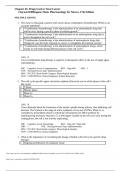
-
Chapter 43: Drugs Used to Treat Cancer Clayton/Willihnganz: Basic Pharmacology for Nurses, 17th Edition
- Exam (elaborations) • 8 pages • 2023
- Available in package deal
-
- $8.49
- + learn more
1. The nurse is educating a patient with cancer about combination chemotherapy. Which is an accurate statement? a. “Combination chemotherapy is the administration of an antineoplastic drug that will be toxic during a specific phase of cellular growth.” b. “Combination chemotherapy is the administration of an antineoplastic drug that is active throughout the cell cycle.” c. “Combination chemotherapy is the administration of antineoplastic drugs that change the way the body respon...
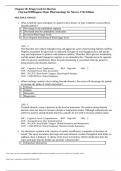
-
Chapter 28: Drugs Used for Diuresis Clayton/Willihnganz: Basic Pharmacology for Nurses, 17th Edition questions with 100% correct answers Download for an A+
- Exam (elaborations) • 9 pages • 2023
- Available in package deal
-
- $8.49
- + learn more
1. What would the nurse anticipate if a patient with a history of type 2 diabetes is prescribed a thiazide diuretic? a. No change in the antidiabetic regimen b. Decreased need for antidiabetic medication c. Increased blood sugar levels d. Less frequent monitoring of blood sugar level ANS: C The thiazides may induce hyperglycemia and aggravate cases of preexisting diabetes mellitus. Regular assessment for glycosuria is indicated. Dosages of oral hypoglycemics and insulin may need adjustm...
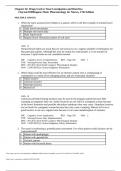
-
Chapter 34: Drugs Used to Treat Constipation and Diarrhea Clayton/Willihnganz: Basic Pharmacology for Nurses, 17th Edition
- Exam (elaborations) • 9 pages • 2023
- Available in package deal
-
- $8.49
- + learn more
1. When the nurse assesses bowel habits in a patient, which is the best example of normal bowel elimination? a. Daily bowel movements b. Multiple soft stools daily c. Daily liquid stools d. Regular bowel elimination pattern of soft stool ANS: D Normal bowel habits are stools that are soft and occur on a regular schedule of elimination for that particular patient. Although this may be routine for some people, it is not normal for everyone. Liquid stools are not considered normal. DIF: C...
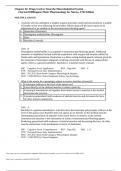
-
Chapter 44: Drugs Used to Treat the Musculoskeletal System Clayton/Willihnganz: Basic Pharmacology for Nurses, 17th Edition
- Exam (elaborations) • 8 pages • 2023
- Available in package deal
-
- $9.49
- + learn more
1. A patient who has undergone a lengthy surgical procedure under general anesthesia is unable to breathe on his own following the procedure. Which drug will the nurse expect to be administered as an antidote to the neuromuscular-blocking agent? a. Dantrolene (Dantrium) b. Neostigmine methylsulfate (Prostigmin) c. Ether d. Baclofen (Lioresal) ANS: B Neostigmine methylsulfate is an antidote to neuromuscular-blocking agents. Additional measures to implement include artificial respirations...
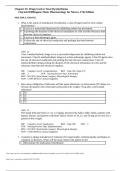
-
Chapter 23: Drugs Used to Treat Dysrhythmias Clayton/Willihnganz: Basic Pharmacology for Nurses, 17th Edition questions with 100% correct answers Download for an A+
- Exam (elaborations) • 7 pages • 2023
- Available in package deal
-
- $8.49
- + learn more
1. What is the action of amiodarone (Cordarone), a class III agent used to treat cardiac dysrhythmias? a. It acts as a myocardial depressant by inhibiting sodium ion movement. b. It prolongs the duration of the electrical stimulation on cells and the refractory time between electrical impulses. c. It acts as a beta-adrenergic agent. d. It slows the rate of electrical conduction and prolongs the time between contractions. ANS: D Class I antidysrhythmic drugs act as a myocardial depressan...
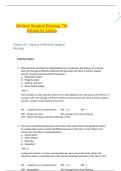
-
TEST BANK FOR MEDICAL SURGICAL NURSING 7TH EDITION,Medical-Surgical Nursing Linton and Basic Pharmacology for Nurses (ALL 1 to 60 CHAPTERS IN ONE BUNDLE) questions with 100% correct answers Download for an A+
- Package deal • 38 items • 2023
-
- $40.49
- 1x sold
- + learn more
TEST BANK FOR MEDICAL SURGICAL NURSING 7TH EDITION,Medical-Surgical Nursing Linton and Basic Pharmacology for Nurses (ALL 1 to 60 CHAPTERS IN ONE BUNDLE) questions with 100% correct answers Download for an A+
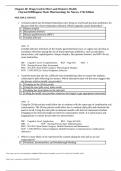
-
TEST BANK FOR MEDICAL SURGICAL NURSING 7TH EDITION Chapter 40: Drugs Used in Men's and Women's HealthClayton/Willihnganz: Basic Pharmacology for Nurses questions with 100% correct answers Download for an A+
- Exam (elaborations) • 8 pages • 2023
- Available in package deal
-
- $9.49
- + learn more
1. A female patient has developed leukorrhea since being on oral broad spectrum antibiotics for the past week for a lower respiratory infection. Which organism causes leukorrhea? a. Herpes simplex b. Mycoplasma hominis c. Human papillomavirus (HPV) d. Candida albicans ANS: D Candida albicans infections of the mouth, gastrointestinal tract, or vagina may develop as secondary infections during the use of broad spectrum antibiotics, such as penicillins, tetracyclines, and cephalosporins. H...

Did you know that on average a seller on Stuvia earns $82 per month selling study resources? Hmm, hint, hint. Discover all about earning on Stuvia


